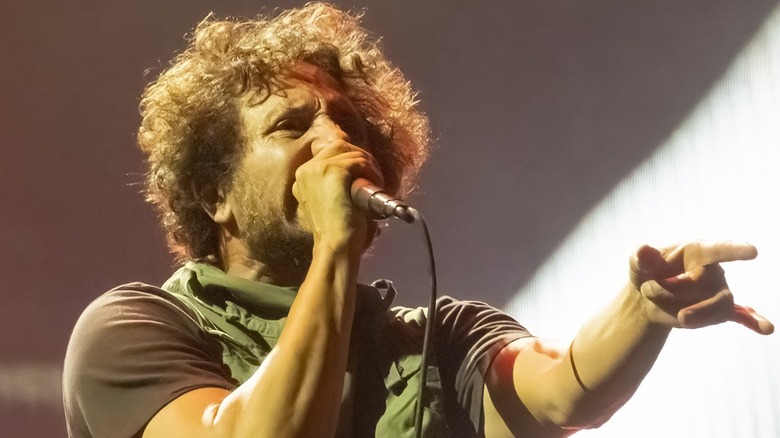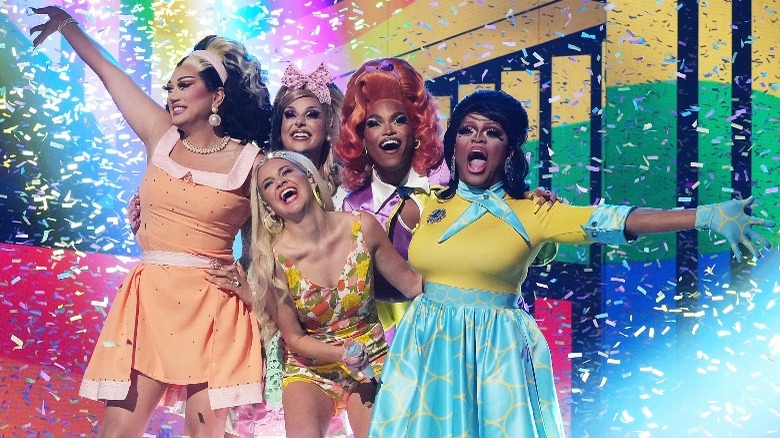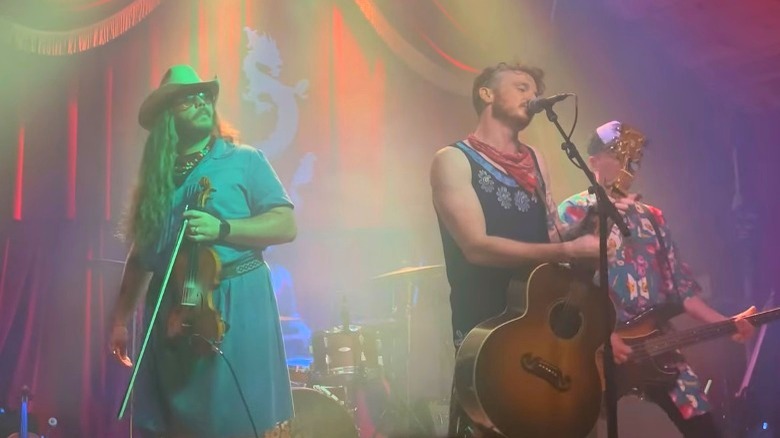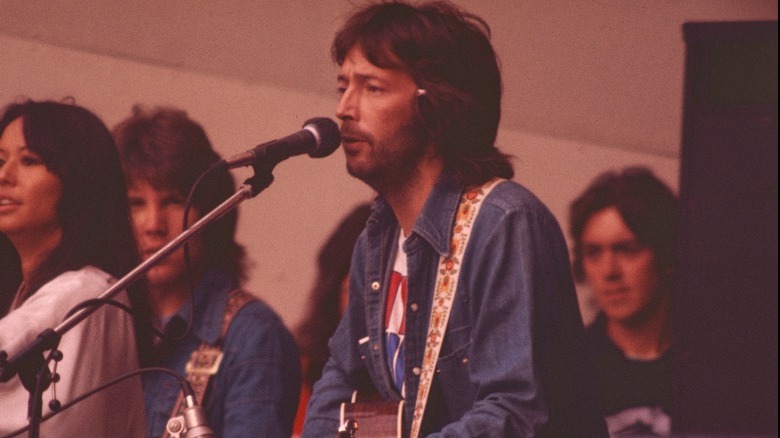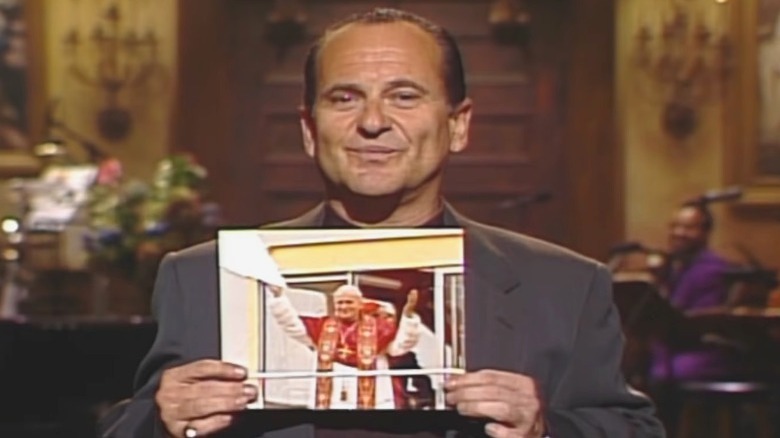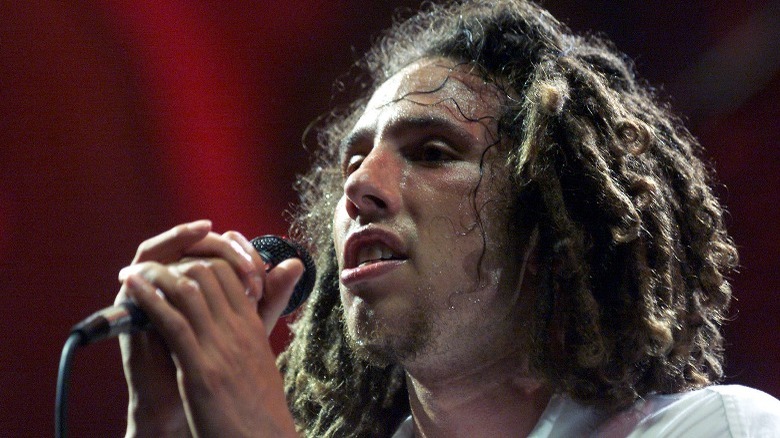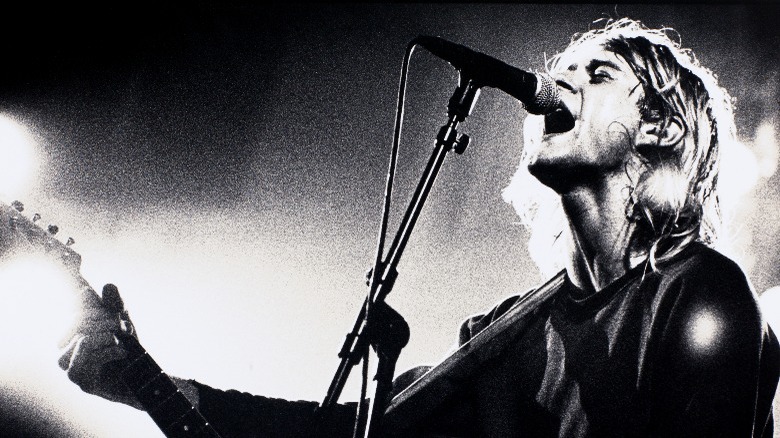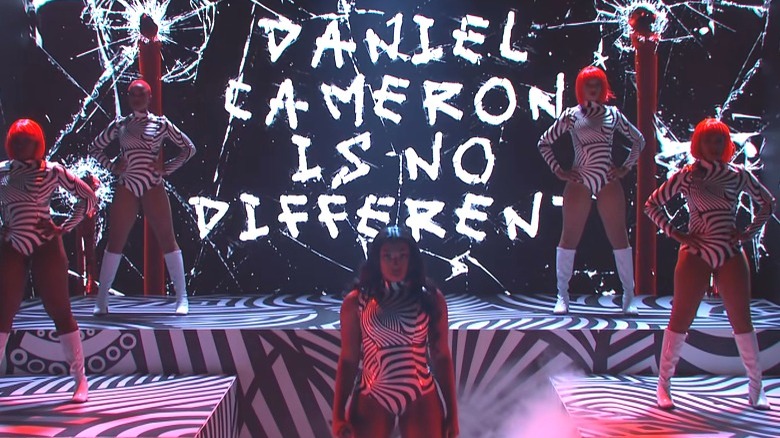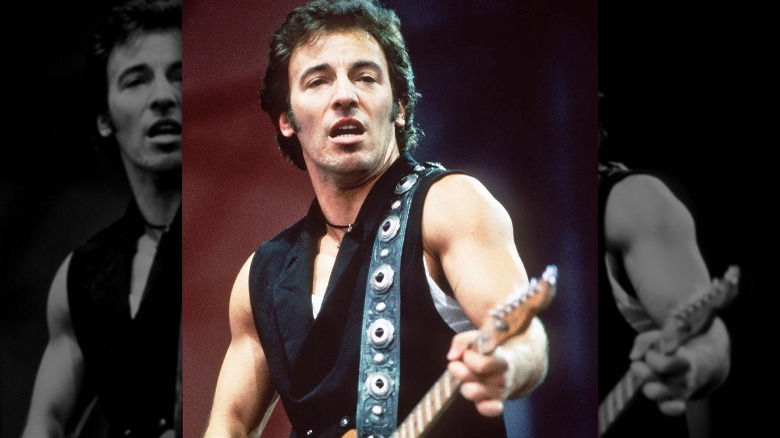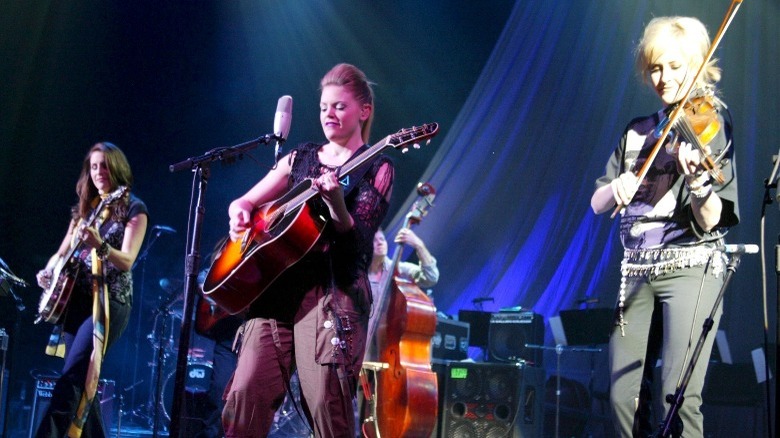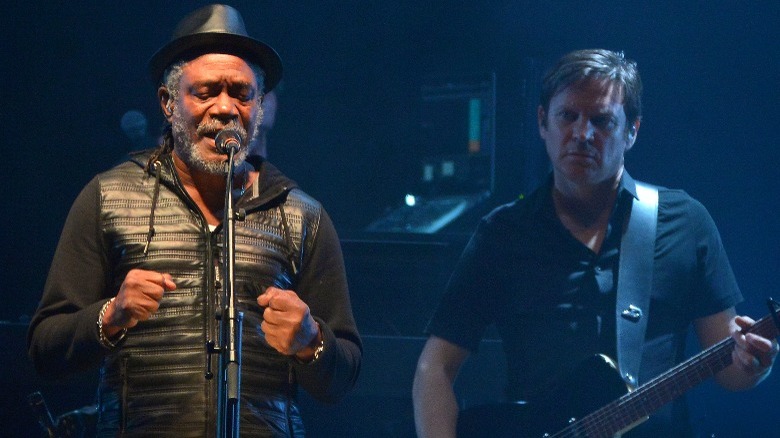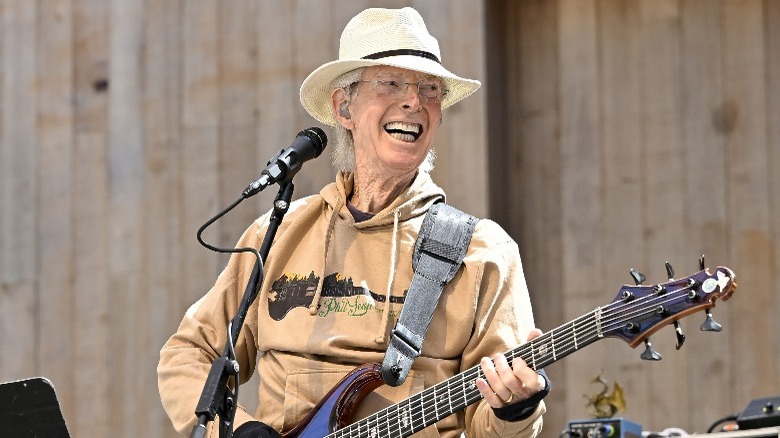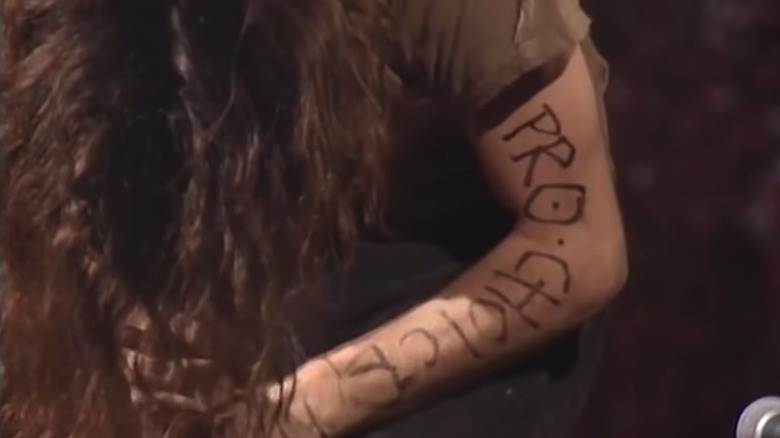Times Music Stars Made Political Statements On Stage
For many musicians and bands, the choice of whether or not to inject politics into their music can be very consequential. While music tends to bring people together as a community, politics can often have the opposite effect, splitting people and bringing in unnecessary vitriol. In addition, many times political songs are used by the very people the artists detest, forcing cease and desist letters and at times inadvertently aligning a group on one side or another of the political spectrum. Then, there's always Ronald Reagan's infamous use of Bruce Springsteen's song "Born in the U.S.A." The song is an antiwar ballad about the struggles of Vietnam veterans, which the former president steadfastly characterized as "a message of hope."
However, there is also the other side of the spectrum: Artists and bands who have no problem with dealing in politics. Take Pink Floyd, for example, who wrote an entire album — 1977's "Animals" — decrying the socio-political conditions of 1970s Britain. Even today, Floyd bass player Roger Waters continues to make political statements with his music, which has caused him considerable backlash.
Not all protests are as dark and depressing as Waters' are, like Bruce Springsteen's message of love and peace while playing the Berlin Wall in 1988. Strangely, even lighthearted TV shows like "Saturday Night Live" have at times become beacons for many politically-twinged performances. While it's not a definitive list, these are some of the times music stars made political statements on stage.
Kelsea Ballerini
When country music fans tuned into the 2023 Country Music Awards, some of them may have gotten a little more than they bargained for. One of the hosts for the evening, Kelsea Ballerini, delivered a poignant message during her performance of the song "If You Go Down (I'm Goin' Down Too)." Previously, Ballerini had been onstage at the CMT awards in 2021 as the "Artist of the Year," and had come back the following year in 2022 to co-host for the first time. However, when she returned to co-host for a second time in 2023, she had a decidedly political message to deliver.
That year, Tennessee played host to the CMT awards, which sparked considerable backlash among some people. This was due to a recently passed law in the state, which many labeled as targeting the drag community. After already making a joke about the new law with co-host Kane Brown, Ballerini had a much larger message in store for her actual performance.
Ballerini was flanked by a quintet of drag queens, all dressed in 1950s-era attire. The onstage performance dovetailed with the lyrics of the song, which talk about shared experiences and staying together through thick and thin — a clear message about the acceptance of the drag community, and a more than thinly veiled protest against the new Tennessee law. Other performers also made pro-drag queen statements during the event, though Ballerini was the only one to do so during her performance.
Male rockers dress in drag
What do the alternative bands Vandoliers, Guster, and Yo La Tengo have in common? A newfound dedication to being allies of the Tennessee drag community. The trend was started by Vandoliers on March 2, 2023. They played a show in Tennessee that night dressed in drag, which took place just hours after lawmakers in the state signed a bill into law that many have deemed to be anti-drag queen. The band, according to an interview with Yahoo Entertainment by member Cory Graves, came up with the idea after reading about the bill and realizing it coincided with their tour date in the state.
They did the act as a non-violent form of protest, and got very gracious responses from their audience. The band even auctioned off their stage-worn attire, donating more than $2,200 to LGTBQ+ charities in Tennessee. After the Vandoliers did it, Guster and Yo La Tengo both followed suit, though it's unclear whether the protests were directly related to each other.
Yo La Tengo also happened to play a concert in Tennessee around the time the bill was signed, and did their protest during a Nashville show's encore on March 13. Guster made their statement on stage in Florida, where they called out another bill working through that state's legislature. It's unknown if the bands will continue to keep up their protests, though Vandoliers frontman Joshua Fleming has already expressed his desire to have actual drag queens on stage with the band.
Eric Clapton
Sometimes, musicians making rash and intoxicated statements actually brings a crowd together, like the ubiquitous "Let's rock!" or "Hello Cleveland!" Other times, their antics can bring criticism and shame, like Jim Morrison allegedly exposing himself onstage in Florida. Then there are the times when what is said on stage is so offensive and outrageous, that it actually inspires the creation of an entire organization dedicated to its repudiation. Enter Eric Clapton and his infamous rant during an August 5, 1976, concert in Birmingham, Great Britain.
By this point in his career Clapton was already massively successful, with the famous "Clapton is God" graffiti proto-memes nearly a decade old. However, Clapton surely lost some fans with his infamous on-stage rant during the Birmingham show. During the concert, Clapton repeatedly urged the crowd to vote for politician Enoch Powell. This was controversial because Powell had infamously given a speech years earlier, essentially advocating for racial and ethnic discrimination. During his rant, Clapton called to "Stop Britain from becoming a Black colony" and to "Keep Britain white" (via Barry Miles in "London Calling").
The incident sparked the creation of Rock Against Racism, an organization specifically dedicated to fighting against racist ideology in rock and roll. Particularly galling about the incident is that Clapton largely built his career by playing blues music, which Black musicians are largely credited with creating. Clapton has since tried to distance himself from the incident, but it will forever remain an ugly stain on his record.
Sinead O'Connor
When most viewers tune in to a weekly episode of "Saturday Night Live," they can generally expect to see at least a few politically charged sketches or jokes. Maybe they'll lampoon the current president or make fun of political faux pas — it's all generally considered fair game at this point. Even so, when Sinead O'Connor was the musical guest on October 3, 1992, fans were stunned by her actions.
No stranger to political statements, O'Connor took the stage that Saturday night determined to make a point. Ending her performance, O'Connor held up a photo of then-Pope John Paul II and ripped it to shreds. She used the image of the Pope to shock the audience and to bring attention to sexual abuse allegations against the Roman Catholic Church.
She was performing a cover of Bob Marley's song "War" when she held up the photo, and the audience — and executives at SNL — were shocked when it happened. Her incident drew a huge negative reaction against herself, leading to SNL banning her. The next week, Joe Pesci showed the picture taped together while expressing his desire to physically assault O'Connor over her actions, which got a thunderous ovation from the audience. O'Connor has always defended her actions, though her career undoubtedly suffered as a result.
If you or anyone you know has been a victim of sexual assault, help is available. Visit the Rape, Abuse & Incest National Network website or contact RAINN's National Helpline at 1-800-656-HOPE (4673).
Rage Against the Machine
Since they first started performing in the early 1990s, Rage Against the Machine has been anything but strangers to political controversy. Even their debut album cover is a picture of the Buddhist Monk Thich Quang Duc immolating himself, in a political protest of the former President of South Vietnam, Ngo Dinh Diem, in the 1960s. Knowing this, it probably should have dawned upon the executives at "Saturday Night Live" that giving Rage an international platform to spread their message might not have been the most TV-friendly idea. This was almost four full years after the Sinead O'Connor incident, after all.
When Rage took the stage, they played their anti-war song "Bulls on Parade" and hung a pair of American flags from their amplifiers. Then, they set them on fire. The band told the LA Times they were making the statement about the host of the show, Republican politician and billionaire Steve Forbes, as well as the tendency of SNL itself to play host to corporate figures while branding itself as a counterculture show. They were promptly removed from the set.
That was far from Rage's only politically charged incident. In 1999, during their performance at Woodstock, Rage again set a flag on fire, this time while playing "Killing in the Name Of," another protest song. A year later, they found themselves performing a concert within throwing distance of the Democratic National Convention, again playing "Bulls on Parade" and railing against the hijacking of American democracy.
Nirvana
The early-1990s was a far simpler time. JNCO jeans were still all the rage, social media had yet to take over the world, and you could hardly walk down the street without seeing frosted tips on every young man in sight. And, of course, Kurt Cobain was still alive and Nirvana was rocking at full force. Hardly a stranger to social or political commentary, Nirvana released their landmark album "Nevermind" in late 1991 and instantly became one of the most-followed bands on the planet.
They were popular enough that they were invited to perform as the musical guest on "Saturday Night Live" the second weekend in January 1992. While you could consider their performance of "Territorial Pissings" a protest itself due to its lyrical content about sexism, the real message came after they had played, during the closing credits.
As the show was ending and the credits were rolling, all three members — Cobain, Krist Novoselic, and Dave Grohl — all made out with each other on stage. It started when Novoselic put his hands on Grohl's shoulder, grabbing him in a tender embrace. Cobain then got in on the action, and soon there were three cis-gender males locking lips on stage together. According to Nirvana, they did so specifically to "piss off rednecks and the homophobes" (via Rolling Stone). It wasn't enough to stop them from being asked back to play SNL in the future, and for many people it is still the best moment in SNL history.
Megan Thee Stallion
The year of 2020 was one of the most consequential in American history. Between the COVID-19 pandemic, the murder of George Floyd in Minnesota, and the shooting of Breonna Taylor in Kentucky, the country was twisted and contorted in a number of uncomfortable and significant ways. That October, then-up-and-coming star Megan Thee Stallion was booked to be the musical guest for "Saturday Night Live," and did not let the opportunity pass her by without making a national statement.
Sparked by the decision of Kentucky Attorney General Daniel Cameron not to bring murder charges against the police officers who shot Taylor to death, Megan performed her song "Savage" but made a distinct political statement. With a huge backdrop that had phrases chastising Cameron as well as America as a whole, Megan actually stopped her performance of "Savage" to play audio recordings from Black activists like Malcolm X and Tamika Mallory.
She also gave a brief speech about protecting Black men and women in the country, pointing out the racial discrimination they often feel. In response to the show, Cameron defended his actions on the Taylor case (via Fox News) and criticized Megan for her statements about him. Cameron noted that he himself is Black, and he took issue with how Megan presented the case.
Bruce Springsteen
For almost three decades, the Berlin Wall stood for many as a symbol of oppression, crisis, and the potential for nuclear war. As a result of the Allied occupation of Germany following the end of the Second World War, and the subsequent Cold War between the United States and Soviet Union that followed, Berlin stood as a divided city from 1945 until 1990. The wall finally came down in 1989, as a result of historic ineptitude, and less than a year later, Berlin was finally reunited for the first time since the end of the Second World War.
While it probably did not play much of a role in the wall's ultimate destruction, just a year prior to its fall, all-American rocker Bruce Springsteen had played a show to hundreds of thousands of fans in East Berlin. Due to the incredible political and military danger, East Berlin wasn't exactly the most happening of spots for rock and roll concerts, making Springsteen's appearance historic in and of itself.
Before starting the show, Springsteen made a very poignant comment referencing the wall, saying he was hopeful that eventually it would not be there. Springsteen read the statement in German, and the massive audience erupted in applause. The concert was also being shown on German state TV, meaning countless more Germans saw it in their homes at the same time. Springsteen then launched into the Bob Dylan song "Chimes of Freedom," and his message washed over millions of Germans, soon to become a reality.
The (Dixie) Chicks
The 2003 invasion of Iraq by the United States was and still remains incredibly controversial. In the decades since, many musical artists and performers have made songs and statements alternatively condemning and supporting the invasion. Yet, of them all, perhaps none have generated the backlash as The Chicks received following remarks they made about the invasion, during a 2003 concert.
Playing in London — and still known as The Dixie Chicks at this point — the band made a very contentious statement midway through their set. Calling out then-President George W. Bush by name, singer Natalie Maines told the British audience that she condemned the invasion of Iraq, and said they were embarrassed that Bush was from Texas. She made the remarks in response to a rally against the war that had been held in Rome the previous month, saying she agreed with the protestors.
Immediately, The Chicks received an onslaught of backlash, and it did not help that, being country artists, their base audience was largely politically conservative. Their music soon faced boycotts and they found themselves in a very volatile situation. Eventually, things blew over and Maines was able to laugh about the incident when they played the same venue a few years later. In 2020, in another socially conscious move, The Chicks formally dropped the word Dixie from their name due to its association with the antebellum South.
Massive Attack
Depending on the message and tone, some political statements can undoubtedly be more subtle than others. Yet, nothing was subtle about the message British artists Massive Attack put out during a 2014 concert in Byblos, Lebanon (according to the Agence France-Presse via the Hürriyet Daily News). During their performance, the band's stage featured a massive backdrop that had statements about the occupation of the Gaza Strip since the 1948 Israeli-Palestinian War. The statements were harshly critical of Israel, which has occupied Gaza since 1967, and whose military had recently launched "Operation Protective Edge," which the statements said resulted in the deaths of thousands of Palestinians.
When asked about the messages backstage, the band defended them and doubled down on their criticisms of the Israeli military and government. In addition to raising awareness, Massive Attack also donated to a refugee youth center inside of Lebanon. Some of the band members had previously visited a Palestinian refugee camp in Gaza prior to the concert, which surely played a role in their decision to make a statement.
The Grateful Dead
Though the Grateful Dead were one of the premiere rock and roll acts of the 1960s counterculture, it might surprise non-fans to learn that they were largely a politically neutral band. Though they largely sympathized with liberal causes, and were certainly no strangers to playing benefit concerts, the band — led by Jerry Garcia — for the most part shied away from having overtly political messages in their music. It wasn't until years after the death of Garcia that the band first made a public political statement, endorsing then-presidential candidate Barack Obama.
Three of the band's surviving members, Bob Weir, Phil Lesh, and Mickey Hart, all appeared onstage at the legendary Warfield Theater in San Francisco to show their support for Obama. The concert occurred in February 2008, just days before the California Democratic Party Primary was held on Super Tuesday. Though the crowd was sold-out and enthusiastic, Hillary Clinton still ended up winning the San Francisco nomination.
It was the first time the post-Garcia Grateful Dead had reunited in years, and they reportedly played a cover of the Beatles song "Come Together." Obama did not attend the concert, but did appear via video during the evening.
Eddie Vedder
As the lead singer for Pearl Jam, Eddie Vedder has more or less been in the public eye since the early 1990s. On many occasions, he has used this as an opportunity to make social and political statements about causes he and the band support. In 1992 leading up to the presidential election, Vedder could regularly be seen wearing a "No Bush '92" t-shirt while onstage (via Rolling Stone). That same year, during a performance on MTV's Unplugged, Vedder made a very public statement supporting abortion rights. Midway through the song "Porch," Vedder grabbed a sharpie and scribbled the words "Pro-Choice!!!" onto his arm and displayed it for the audience.
A decade later, Vedder still wasn't done, and was very vocal about his distaste for the 2003 invasion of Iraq. Supporting the release of their alum "Riot Act," Pearl Jam went on a nationwide tour that year. One of the songs on that album was "Bu$hleaguer," a thinly veiled reference to then President Bush, and sometimes when they played it live, Vedder would destroy a Bush-mask on stage. During concerts in New York, Vedder and the band faced boos when playing the song live. Though the controversy soon simmered over, it was a significant moment for the band, and still resonates decades later.
